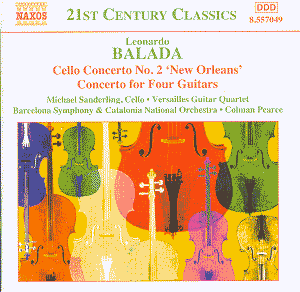An earlier NAXOS disc with music by Balada (8.557090
reviewed
here some time ago) left me somewhat puzzled and unconvinced.
In fact, I felt then that his expressionistic idiom was not particularly
well suited to these tragic-comic cartoon chamber operas (Hangman,
Hangman! and The Town of Greed). I thus
welcome the opportunity to revise my lukewarm opinion of his music.
On the whole Balada’s recent music is rather
more eclectic than some of his earlier works, such as the very
fine Concerto for Four Guitars and Orchestra heard
here and dating from 1975. Balada’s earlier music is more consistently
expressionistic and, to a certain extent, more radical, though
never intractably so. The concerto is full of imagination, invention,
with many arresting instrumental touches. I particularly like
the second movement sounding as a "gigantic music box".
This is rather demanding stuff but well worth investigating. The
Versailles Guitar Quartet possess both the virtuosity and the
musicality to bring it off in the best possible way. They have
also done much to foster new works for their medium and I suggest
that you look for another disc (DE PLEIN VENT DPV 9895) with three
concertos for guitar quartet and orchestra by Georges Delerue,
Franz Constant and Frederico Moreno-Torroba.
Balada’s Second Cello Concerto "New
Orleans" sets out to pay some tribute to the Afro-American
folk culture present in jazz and blues, among other. Its two movements
Lament and Swinging are musically clear enough.
The first movement has a prominent singing quality, at times sorrowful
and dramatic, based, or so it sounds to me, on a tune close to
Amazing Grace (or am I wrong?). The second movement is
a long dance-like romp. Again Balada’s style is rather eclectic,
though quite effective and colourful, but I believe that Ohana’s
magnificent Second Cello Concerto In dark and blue goes
much deeper into the Afro-American soul.
The two recent orchestral works Celebració
of 1992 and Passacaglia of 2002 were both written
on commission, the former from the Generalitat of Catalonia and
the Banco Bilbao-Vizcaya for the millenium of Catalonia and the
latter from the Fifth Cadaqués International Conducting
Competition (the ‘official’ first performance was conducted by
Sir Neville Marriner). In Celebració, the
music, as it were, travels through the ages opening with a somewhat
medieval, plainsong theme and running through Catalan folk-tunes
and modern harmonies. Passacaglia rather reverses
the process in that it begins as a classical passacaglia
and ends with echoes of its ancestor, the Spanish pasacalle.
Both works may be occasional ones, but are quite attractive and
entertaining.
Excellent performances by all concerned, and
very fine recording throughout. Well worth having and will help
redressing the balance, if – like me – you had been somewhat dissatisfied
by Balada’s chamber operas on Naxos.
Hubert Culot
see also
Leonardo
BALADA (b.1933) Concerto for piano
and orchestra No 3 (1999) Concerto Magico for Guitar and orchestra
(1997) Music for Flute and Orchestra (2000)
Leonardo
BALADA (b.1933) Music for Oboe and Orchestra: Lament from
the Cradle of the Earth (1993) [20.42]
